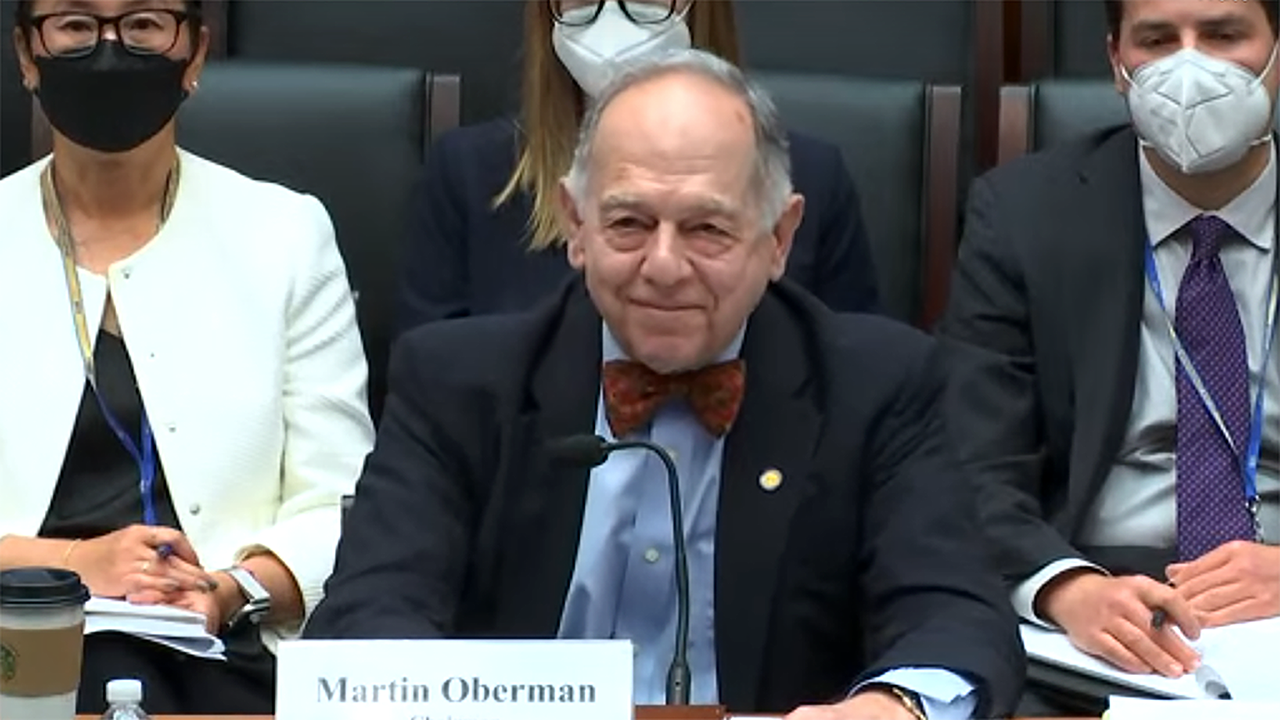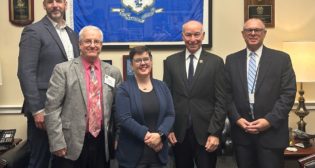
STB’s Oberman Announces Departure Date (UPDATED, 4/29)
Written by Frank N. Wilner, Capitol Hill Contributing Editor
Screenshot from an STB hearing on rail service.
In a category 5 hurricane force stunning announcement, Surface Transportation Board (STB) Chairperson Martin J. Oberman announced late on Nov 16 that he will not seek renomination to a second term (his first term expired Dec. 31) and depart the agency in early 2024 during his statutory 12-month holdover period.
Oberman’s retirement will take effect May 10, 2024, the Chair reported April 26, noting that he informed President Joseph R. Biden Jr. by letter.
“It has been an honor and a privilege to serve the United States as Board member and Chairman of the Surface Transportation Board,” Oberman said. “I leave government service with the greatest respect for the work of the Board and for the agency staff, who have an unrelenting commitment to public service.”
Oberman, now age 78, took office in January 2019 as the oldest rail regulator to have been sworn-in in the now more than 136-year history of the STB and its Interstate Commerce Commission predecessor. Until President Biden names a new permanent chairperson, the agency’s vice chairperson—who is determined internally—will become acting chairperson upon Oberman’s departure.
Although Democrat Karen Hedlund currently serves as vice chairperson, tradition holds that the vice chair slot rotates annually among members. It is probable, but not certain, that the Board either will extend Hedlund’s term or choose Democrat Robert M. Primus.
There is no clock ticking on Biden’s choosing of a new permanent chairperson. It is logical that Primus has an edge on Hedlund for the permanent chairperson slot, but Biden could also nominate a Democratic successor to Oberman, with intent to name that successor permanent chairperson upon Senate confirmation.
Primus’ edge is owed to his almost two decades in senior House staff positions, gaining for him numerous Democratic friends in the House and Senate who likely would lobby the White House on his behalf. Not coincidentally, several very left-of-center public interest groups wrote Biden in 2023 urging that Oberman be demoted from chairperson to member and Primus be elevated to chairperson, the reason being Primus’ lone dissent to the Board-approved Canadian Pacific-Kansas City Southern merger.
For sure, Primus, whose second term expires in December 2027, made new friends among shippers and rail labor following his sometimes-searing cross examination of rail CEOs during STB public hearings into rail safety and service lapses. Primus also has a friend in South Carolina Democratic Rep. James Clyburn, the assistant Democratic leader in the House, who was instrumental in Biden’s 2020 Democratic primary victory in South Carolina.
Hedlund, whose first term expires in December 2025, has a background in infrastructure consultancy, a special interest in passenger rail issues and a demeanor less confrontational than that of Primus. She has more experience in transportation, but less in politics than Primus. At age 75, she might opt out of consideration for permanent chairperson. (Primus is 51; Republican Patrick J. Fuchs, whose first term expires Dec. 31 and who is seeking a second term, is 35; and Republican Michelle A. Schultz, whose first term expires in December 2025, is 50.)
Regardless of whether Biden opts to leave an acting chairperson in charge or names a new permanent chair, a Republican victory in 2024 would allow the incoming Republican President to name a Republican permanent chairperson as early as late January 2025. That could tee-up Fuchs for permanent chairperson, but not necessarily—assuming, of course, Fuchs is renominated and reconfirmed by the Senate to a second five-year term.
Fuchs, a former senior staff member on the Senate Commerce Committee, has earned the respect of railroads and achieved a reputation among shippers as “calm,” “solid” and “seriously thoughtful.” In fact, major shipper groups are backing him for a second term, having sent letters of support to the White House. If not renominated and reconfirmed, Fuchs may remain at the Board in holdover status for up to 12 months (mid-January 2025) or until a successor is Senate-confirmed.
While railroads are not expected to oppose a second term for Fuchs, they are promoting—arguably only in the event of a Republican entering the White House in late January 2025—a Republican who has been pushing rail industry policy objectives through prolific production of position papers and commentary intended to influence lawmakers and regulators. Fuchs would be seen as the more balanced, knowledgeable and broadly supported choice.
Railroads may not shed tears over Oberman’s departure, given his outspoken reproval of railroad operating practices, service deficiencies, arguably excessive layoffs of train and engine crews, alleged market power abuses and his desire to tighten the definition of the common carrier obligation. But what the public loses with either Primus or Hedlund in succession is a consensus builder with a trial attorney’s continuous probing of every facet of every dispute and someone quite opposed to authoritarian leadership based on a political majority.
Given the decision-making influence of the Senate’s second ranking Democrat—Majority Whip Dick Durbin of Illinois—it’s understandable that four contenders have Chicago area ties, reflecting also the city’s reputation, as poet Carl Sandburg said, as “player with railroads and the nation’s freight handler.” Chicago’s Oberman is a product of Durbin’s influence as is STB Chicago-rooted Democrat Karen Hedlund.
Politics is a contact sport, however, and Senate Republicans are unlikely to allow confirmation of a Democratic successor before the November election. Oberman’s departure gives the STB a 2-2 party split, so confirming a third Democrat to the five-person board would hand Democrats a majority in a possible Trump Administration.
Biden still is likely to make a nomination, because also in politics, one never knows.
On Biden’s list are Chicago Metra board member Melinda Bush; Chicago Transit Authority President Dorval Carter Jr.; former House Transportation & Infrastructure (T&I) Committee Chairperson Peter DeFazio of Oregon; former congresswoman Marie Newman of a nearby-Chicago county; and Chicago-rooted Senate Commerce Committee staffer Melissa Porter. Except for Porter, all tote problematic baggage.
- Melinda Bush, 67, a former labor union leader, joined Chicago Metra’s board in 2023. Previously, she was vice chair of the state senate’s transportation committee. In earning an Illinois Environmental Council 100% favorable voting record, she supported passage of a Coal Ash Pollution Act opposed by energy interests and was active with the Environmental Justice movement.
- Dorval Carter, 65, was named CTA president in 2015. Previously, he was chief of staff to Obama Administration Transportation Secretary Anthony Foxx and assistant chief legal counsel at the Federal Transit Administration. As reported by Chicago media, Carter is faulted for numerous alleged CTA ills and for rarely riding the trains.
- Peter DeFazio, 76, gained the T&I chair based on seniority—not personality. He distinguished himself by being shut out by fellow Democrats during finalization of the 2021 $1 trillion bi-partisan Infrastructure Investment and Jobs Act that he derided as “crap.” He has a strong allegiance to labor. Recently, DeFazio registered to lobby on behalf of trucking interests.
- Marie Newman, 59, was a one-term (2021-2023), politically left House member, having dealt a Democratic primary defeat to moderate Dan Lipinski to gain a Chicago-area seat held by Lipinski and his father for 38 years. A Green New Deal supporter, she served on the House Rail Subcommittee. Until leaving office, she was the subject of a House ethics probe into allegations she “may have promised federal employment to a primary opponent for the purpose of procuring political support.” Newman currently heads a Chicago non-profit organization.
- Melissa Porter, 48, is Senate Commerce Committee deputy staff director. Previously, she was general counsel to the Chicago Metropolitan Agency for Planning, a Department of Transportation senior associate counsel, and the Federal Railroad Administration’s chief counsel.
Railway Age Capitol Hill Contributing Editor Frank N. Wilner is a former STB chief of staff and assistant vice president for policy at the Association of American Railroads. He is author of the newly published book, Railroads & Economic Regulation, available from Simmons-Boardman Books at www.transalert.com, 800-228-9670.
Further Reading
- Not So Fast on Oberman’s STB Successor
- Fuchs Renominated to Second STB Term
- Oberman, the Pragmatist, May be Missed



